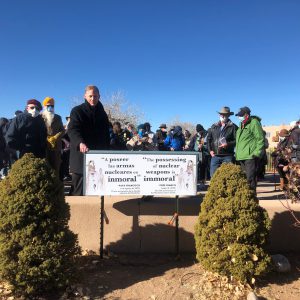“[Nuclear Diarmament] is a human life issue. This is the sanctity of life because nuclear arms, in fact, could wipe out life as we know it. It can wipe out the planet. It’s an issue of poverty. What are we gonna do in New Mexico? We have a huge issue in poverty. We’re spending, the next [30] years, $1.7 trillion on our nuclear arsenal; that money could go to the poor.”
The Santa Fe Reporter February 2, 2022 sfreporter.com
 When John C Wester returned to Santa Fe after visiting Hiroshima and Nagasaki in 2017, he noticed a jarring juxtaposition between the atrocities committed by the United States government and the proximity of his work to the birthplace of the nuclear bomb. It opened his eyes to the line that had been crossed. As the Archbishop of the Santa Fe Archdiocese, Wester called for a renewed conversation for nuclear disarmament in a pastoral letter published last month.
When John C Wester returned to Santa Fe after visiting Hiroshima and Nagasaki in 2017, he noticed a jarring juxtaposition between the atrocities committed by the United States government and the proximity of his work to the birthplace of the nuclear bomb. It opened his eyes to the line that had been crossed. As the Archbishop of the Santa Fe Archdiocese, Wester called for a renewed conversation for nuclear disarmament in a pastoral letter published last month.
You call for a serious conversation about nuclear disarmament here in New Mexico, but two of the key players in that discussion, Los Alamos and Sandia National Laboratories, have been pretty quiet. Have you spoken with representatives from either of the labs and, if not, do you have an idea about how to get them to the table?
The letter is addressed to all in the archdiocese and beyond so by default the letter was meant for everybody and certainly for them. I do include the labs in my letter because I realize many of our Catholics, and many people beyond the Catholic Church, obviously worked at the labs. That’s their livelihood, so I recognize their involvement. For example we have a parish, Immaculate Heart [of Mary], in Los Alamos and I’ve already talked to the pastor there…and he was very eager to engage in this conversation that the letter calls for. So my understanding is that he is working, talking with parishioners and there’s a group of Catholic scientists there.
I want to hear what they have to say. It’s not for me to debate it, it’s to have a conversation about it. What are our mutual concerns about atomic weapons? What are our mutual concerns about the arms race that we’re in now? What are our mutual concerns about developing pit cores and modernizing the nuclear arsenal?
My belief is that people of goodwill will recognize that, A) we don’t want war—nobody wants war, and that, B) nuclear arms have ratcheted war into a whole other arena that we’ve just really never experienced except for the bombs dropped on Japan.
With so many pressing humanitarian issues in front of us (climate change, the pandemic, etc.), why is now the time to be discussing nuclear disarmament?
I think that nuclear disarmament really is a part of many of the conversations and issues we’re already dealing with. So for example, the Catholic Church is very concerned with the sanctity of human life, from conception to natural death. And this is a human life issue. This is the sanctity of life because nuclear arms, in fact, could wipe out life as we know it. It can wipe out the planet. It’s an issue of poverty. What are we gonna do in New Mexico? We have a huge issue in poverty. We’re spending, the next [30] years, $1.7 trillion on our nuclear arsenal; that money could go to the poor.
Many say that the Catholic Church has crossed numerous humanitarian lines, including rampant sexual abuse by clergy and a decades-long cover-up of it. How do you differentiate between the dangers of nuclear proliferation and the damage caused by the church’s own failures when it comes to human rights, and why should the public consider the church a moral authority on human rights?
From my point of view the Catholic Church, I think, has come to grips with the terrible evil of child sexual abuse, the terrible victimization of children through sexual abuse. And I think that the church, especially since 2002, when we had our bishop’s meeting in Dallas, Texas, have come to grips with that. It’s going to be an ongoing thing. It’s not like you just do it once and you’re done. We continue to work very hard on this issue.
We could apply the same thing to nuclear disarmament. I think that all of us have to come together, as much as the church is trying to do, in order to do something about this terrible evil and this terrible problem we have of nuclear proliferation. And so, you know, I think it shows that we can do something, that we can roll up our sleeves and work [on] this problem. Is it going to be perfect? No. We’re human beings. We’re always learning. The two issues that you bring up are connected in that they’re both terrible things, but we mustn’t feel that we’re powerless.
